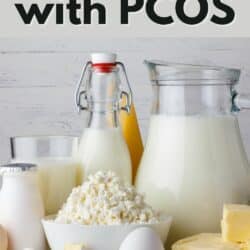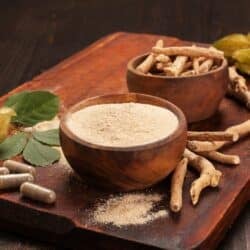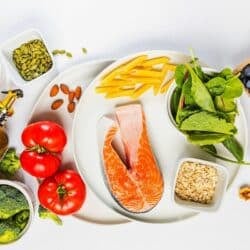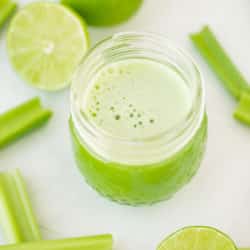5 Reasons You Should Avoid Dairy Foods with PCOS
In this article, we’ll review the connection between dairy consumption and PCOS, and five reasons why you may wish to avoid dairy products while managing symptoms of this hormonal disorder. I also share my experience with going dairy-free and how it’s affected my PCOS.
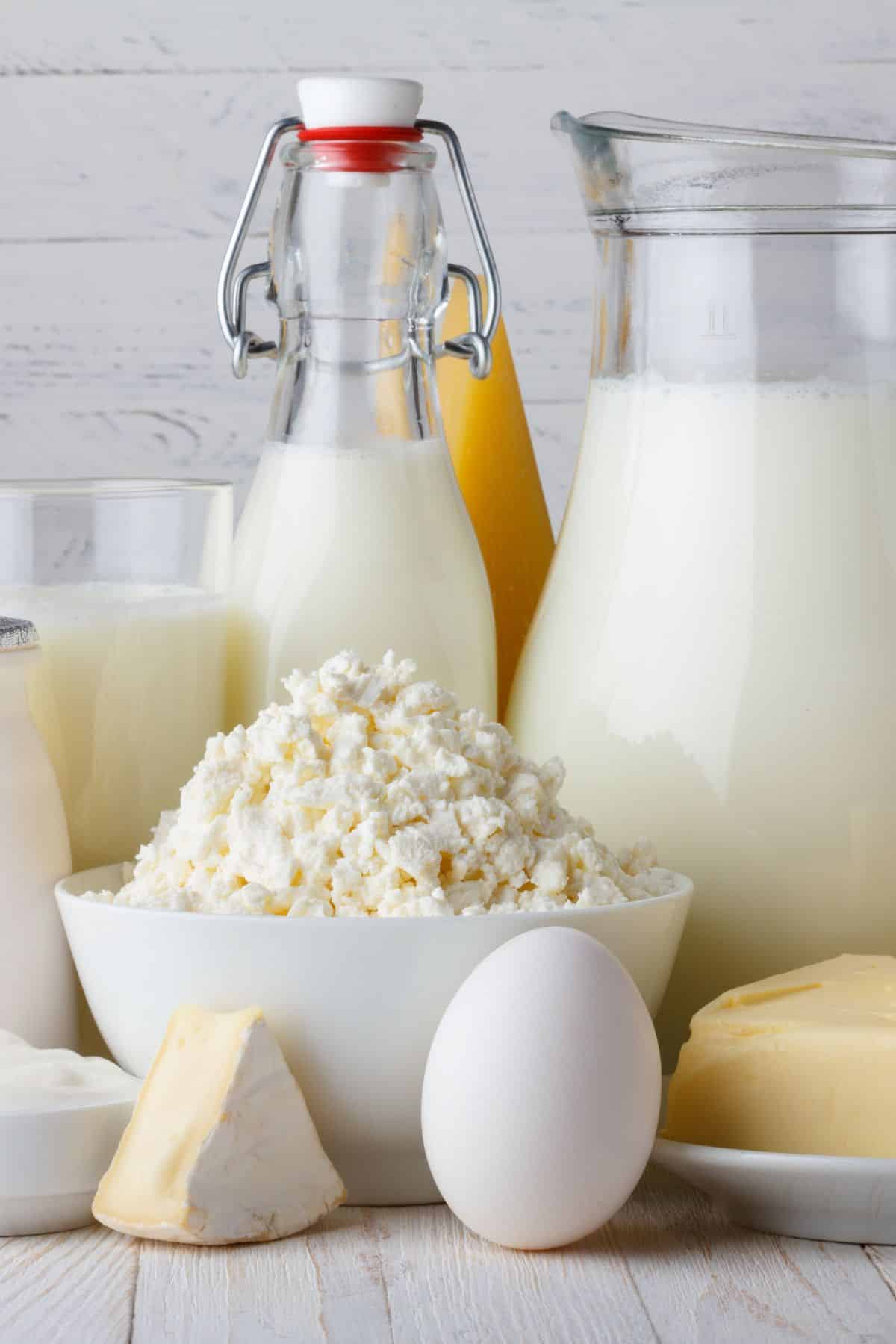
Polycystic ovary syndrome (PCOS) is a condition that affects a woman’s hormone levels, leading to the production of more male hormones than normal. This can cause problems with your periods and make it difficult to get pregnant.
PCOS may also cause unwanted changes in the way you look and could lead to serious health problems, like diabetes and heart disease (cardiovascular disease).
Reasons to Avoid Dairy with PCOS
If you’re trying to do a PCOS diet for weight loss or to manage symptoms, you may want to consider reducing or cutting back on your dairy intake altogether. This includes foods like low-fat milk, cottage cheese, cheese, whey proteins, and all dairy milk.
Here are five compelling reasons why dairy foods might be making your PCOS worse.
1. Insulin Resistance
PCOS often goes hand in hand with insulin resistance – a problem that experts have found affects both obese and lean women.
Insulin resistance – also known as insulin sensitivity – can have a negative impact on ovulation, because it can prompt your body to create too much testosterone. It can also lead to weight gain, and make it hard to lose weight going forward.
In an ideal situation, your insulin levels should rise once you’ve eaten, prompting your liver and muscles to turn the sugar from your blood into energy. At that point, both your blood sugar and insulin levels should drop.
But if you are insulin resistant, your body’s cells don’t respond as they should to the insulin produced by your pancreas.
To try to overcome the resistance, it makes even more insulin – and your levels rise too high as a result. Eventually, your pancreas can no longer produce enough insulin to keep your blood sugar levels under control, potentially leading to type 2 diabetes.
Dairy products, especially those with a high sugar content like flavored milk or ice cream, can increase insulin levels, potentially exacerbating the condition and making weight loss very difficult, along with higher than usual testosterone levels.
2. Inflammation
PCOS is linked with chronic low-grade inflammation, with blood tests showing that sufferers have higher than usual levels of certain inflammatory markers.
One way to reduce chronic inflammation is to reduce the number of trans fats (also called trans-unsaturated fatty acids) in your diet. Indeed, research has shown a link between low-grade inflammation and a diet high in trans fats.
Some dairy products naturally contain trans fats, although these tend to be in smaller amounts and are reasonably safe when consumed in moderation.
But artificial trans fats – also known as partially hydrogenated fats or industrial trans fats – have much more potential for harm. They are created when vegetable oils are chemically processed to increase their shelf life, and may not only worsen inflammation but can also raise the risk of heart disease.
Some ice creams and other processed dairy desserts can be high in trans fats, which usually appear as partially hydrogenated oil on the list of ingredients. Some processed cheeses may be high in trans fats too.
3. Hormonal Impact
Hormonal imbalances are common in women with PCOS, leading to symptoms like acne, hair loss, irregular periods, infertility, and hirsutism (the growth of facial hair or excess body hair).
Dairy products contain certain hormones and insulin-like growth factors, which could potentially influence these imbalances.
While not directly related to PCOS, studies on men and children showed that the ordinary intake of cow’s milk products could influence hormones to such an extent that the way in which children sexually matured was affected.
4. Digestive Issues
Women with PCOS tend to have high levels of luteinizing hormone (LH) and follicle-stimulating hormone (FSH). As a result, ovulation is affected and periods may become irregular.
But these hormones may also contribute to IBS (irritable bowel syndrome), with studies showing that too much LH and FSH can slow the progress of food through the digestive tract, potentially leading to constipation.
For women with PCOS and IBS, dairy and the consumption of milk can just make matters worse. Its high fat content can lead to diarrhea, or simply intensify existing symptoms.
5. Allergies and Food Sensitivities
There are no studies proving a link between food allergies/intolerance and PCOS, but some people find that they react to certain foods and that the subsequent inflammation in their bodies makes their PCOS symptoms worse.
This can certainly be the case with dairy-based foods. For some people, milk intake worsens their acne – a common PCOS symptom. Indeed, there is some scientific evidence that whole milk (full-fat dairy), low-fat dairy products, and skim milk could contribute to the problem.
Another potential problem caused by dairy consumption is lactose intolerance. This is where the body cannot properly digest lactose, the sugar found in milk, leading to problems like bloating, diarrhea, and stomach cramps.
Dairy allergy can be a problem, too. This involves the immune system and is where your body mistakenly reacts to milk as if it’s a harmful substance. It then releases substances that cause the typical allergy symptoms, from mild rashes to more serious problems like breathing difficulties.
Getting Calcium & Vitamin D on a Dairy-Free Diet
Calcium plays an important role in the maintenance of your teeth and bones, with the average adult needing around 1,000 mg every day from a balanced diet.
Fortunately, there are lots of great sources of calcium besides dairy. These include:
- Seeds, including poppy, sesame, chia, and flax
- Canned salmon and sardines (be sure to eat the soft bones, as these contain the most calcium)
- Amaranth
- Quinoa
- Fortified bread, juice, and cereal
Experts recommend that you eat lots of calcium-rich foods instead of relying on calcium supplements. That’s because supplements have been shown to raise the risk of cardiovascular problems.
It’s also important to maintain the right levels of vitamin D, which helps you absorb calcium and also reduces the risk of conditions like osteoporosis and depression. Our bodies make vitamin D when our skin is exposed to the sun, with only around 10 to 15 minutes of exposure needed per day.
But, we don’t always make enough this way and there are very few foods that contain vitamin D naturally. For that reason, you’ll often need to look for foods fortified with vitamin D, such as cereals, bread, and orange juice.
You may also want to speak to your healthcare provider about taking vitamin D supplements. See my list of the best bone supportive supplements.
Best Dairy Alternatives With PCOS
What are dairy alternatives suitable for someone with PCOS?
Instead of drinking cow’s milk, you can try alternative milks made from almonds, cashews, coconut, hemp, flaxseed, or soy milk. Be cautious with rice milk or oat milk, though, as both are high in carbohydrates and may have a negative impact on your blood sugar levels.
Instead of butter, try olive oil or coconut oil. Mashed avocado, banana, or applesauce can be great butter substitutes when baking.
When it comes to cheese, look for dairy-free alternatives. Flavors can vary quite a bit from brand to brand, so it’s worth sampling several. I also recommend giving nutritional yeast a try! It has a satisfying, cheesy quality and is a good source of B vitamins. You can use it to make cheesy sauces or sprinkle it over anything from potato dishes to pasta.
My Experience With Going Dairy-Free
As someone with personal experience of having PCOS, I can say that going dairy-free was one of the best things I’ve ever done. I have had PCOS since my early teens and I have been dairy-free for about 15 years now.
Once I stopped consuming all types of dairy products, my digestive symptoms improved and my PCOS symptoms have almost gone away completely. It’s been easier to achieve and maintain a healthy weight and has a beneficial effect on the regularity of my cycle.
FAQs
Some dairy products like processed frozen dairy treats and certain processed cheeses are high in trans fats, which have been linked to increased inflammation. It’s definitely worth cutting these – and other foods high in trans fats – out of your diet, as doing so may help relieve your symptoms.
Certain types of dairy may be beneficial for people with PCOS. Fermented dairy products like yogurt, for example, have been shown in some studies to have health benefits, including improved gut health and possibly reduced inflammation.
And whereas whole milk, low-fat and skim milk have been found to worsen acne – one of the common symptoms of PCOS – neither yogurt nor cheese had the same effect.
Don’t Miss These Additional PCOS Resources
Conclusions
Avoiding certain dairy products can help ease the symptoms of PCOS by reducing insulin resistance and inflammation, rebalancing the hormones, and avoiding digestive discomforts. It may be worth doing an elimination diet to see if cutting out dairy helps with your PCOS symptoms.
Don’t forget to join my newsletter list to get exclusive clean eating recipes and tips. The newsletter is 100% free with no spam; unsubscribe anytime.
About the Author: Carrie Forrest has a master’s degree in public health with a specialty in nutrition. She is a top wellness and food blogger with over 5 million annual visitors to her site. Carrie has an incredible story of recovery from chronic illness and is passionate about helping other women transform their health. Send Carrie a message through her contact form.
Note: this post is for informational purposes only and is not intended as medical advice. Please consult your healthcare provider for recommendations related to your individual situation.


